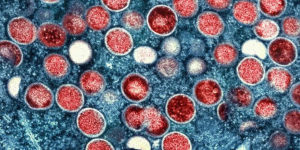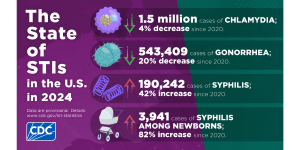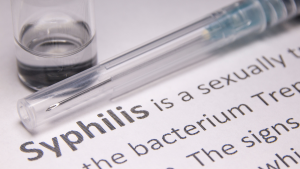
New Mpox Cases in California Raise Concern
A more serious type of mpox may be spreading California. Three people in the state were hospitalized with the virus.

Rates of congenital syphilis—infections passed from parent to infant during pregnancy or childbirth—have been skyrocketing in the United States in the last few years. At the same time, the country is facing a severe shortage of the only antibiotic that has been approved to treat syphilis in pregnant women. A new survey of health care providers by the National Coalition of STD Directors (NCSD) has found that this shortage is indeed delaying care for pregnant patients.
CDC data show that more than 3,700 babies were born with syphilis in 2022—more than 10 times the number born in 2012. These infections can lead to miscarriage, stillbirth, prematurity, low birthweight, or death shortly after birth. Treatment during pregnancy can help both parent and child, but the shortage of Bicillin-L-A is making that very difficult.
Bicillin L-A, which is also called penicillin G benzathine, is the preferred treatment for primary and secondary (P&S) syphilis all populations. It is the only treatment approved for pregnant people. There have been shortages of this drug before—first between 2005 and 2010 and again in 2017 as congenital syphilis cases became more common. Pfizer is currently the only pharmaceutical company that makes this medication. It announced a manufacturing delay in June. The company said shortages would likely go on through 2024.
In the meantime, the CDC is suggesting that clinicians prioritize Bicillin L-A for pregnant people with syphilis and babies with congenital syphilis. All other patients should get doxycycline.
In late August, the National Coalition of STD Directors (NCSD) surveyed more than 100 sexual health clinics to determine how the drug shortage was affecting them and their patients. It found that in the three months prior to the survey, 40% of clinics had attempted to order Bicillin L-A only to be told it was not available. In addition, 28% of clinics said they had to get the drug from a nearby clinic or refer the patients elsewhere for treatment.
NCSD sent out another survey in early November and got responses from 151 clinics and 136 health departments. Respondents represented 39 states, one territory, Washington, D.C., and communities served by Indian Health Services. The results show that the drug shortage is worsening, and that patient care is being impacted.
Respondents were asked about the three months prior to the survey. Results included:
Health department respondents from 13 different states and one Indian Health Services agency say they’ve received reports of a pregnant person in their jurisdiction who was unable to access Bicillin L-A (All of these pregnant patients did receive treatment, but there were delays of up to 28 days in getting that treatment.)
Only 13% of clinic respondents believe Pfizer’s assurances that the Bicillin L-A shortage will be resolved in the first half of 2024
To control the rising rates of congenital syphilis and prevent illness and death among infants, pregnant people need access to screening and treatment. If this drug shortage does not end soon congenital syphilis rates will likely get even worse.

A more serious type of mpox may be spreading California. Three people in the state were hospitalized with the virus.

ASHA announces Rebecca (Becca) Karpinski as the Interim President and CEO of ASHA.

The CDC just released STI Surveillance Data for 2024 that show cases of chlamydia, gonorrhea, and syphilis are slowly declining.

Experts say that vaccinating newborns against hepatitis B is one of the most important things we do to protect infants.

A new study found that a single shot of benzathine penicillin G (BPG) treated early syphilis as well as the standard three-injection regimen.

An antibiotic that is important in the fight against syphilis will once again be hard to find, this time because of a voluntary recall by the manufacturer.
ASHA believes that all people have the right to the information and services that will help them to have optimum sexual health. We envision a time when stigma is no longer associated with sexual health and our nation is united in its belief that sexuality is a normal, healthy, and positive aspect of human life.
ABOUT
GET INVOLVED
ASHA WEBSITES
GET HELP
© 2026 American Sexual Health Association
We need to know if we can keep you company during this visit. We are useful for making this site work.
We use cookies to enhance your browsing experience. You can choose which cookies you want to accept.
Necessary cookies help make a website usable by enabling basic functions like page navigation and access to secure areas. The website cannot function properly without these cookies.
| Cookie | Provider | Purpose | Expiry |
|---|---|---|---|
digiconsent | This website | Stores your cookie consent preferences. | 1 year |
wordpress_logged_in_* | WordPress | Identifies logged-in users and their authentication details. | 14 days / Session |
wordpress_sec_* | WordPress | Stores authentication details for secure areas. | 14 days / Session |
wp-settings-* | WordPress | Stores user interface customization preferences. | 1 year |
wp-settings-time-* | WordPress | Stores the time when wp-settings cookie was set. | 1 year |
Analytics cookies help us understand how visitors interact with our website by collecting and reporting information anonymously. This helps us improve our website.
Marketing cookies are used to track visitors across websites. The intention is to display ads that are relevant and engaging for the individual user.
Functional cookies enable the website to provide enhanced functionality and personalization. They may be set by us or by third party providers.